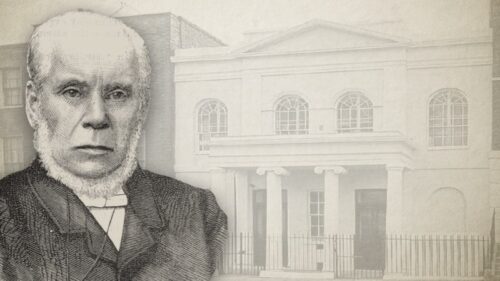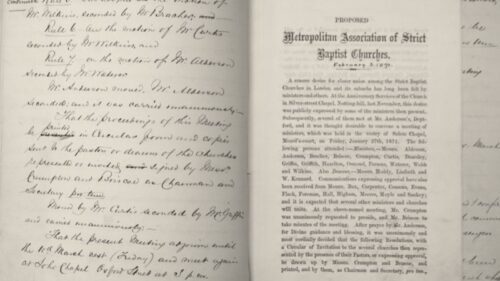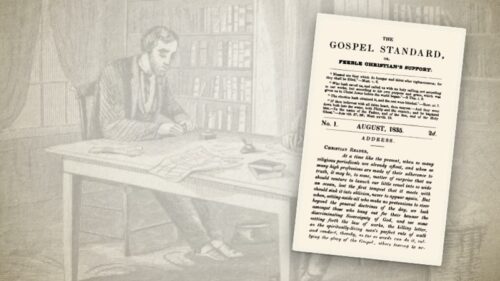-
2. As A High-Calvinist, John Gill Was Responsible For Killing A Gospel Spirit Among The Particular Baptists?
John Piper asserts: “Fuller himself certainly saw Gill as a High Calvinist responsible for much of the evangelistic deadness among his fellow Particular Baptists.” There is an article written by George Ella called, “Exaggerated Claims Concerning Andrew Fuller And False Information Regarding ‘High-Calvinists’”. Ella points out: “1795-1835 was a time of widespread revival with Anglican Robert Hawker preaching to thousands, Independent William Huntington equalled his efforts and Baptist William Gadsby founding 45-50 churches filled with new converts. The Particular Baptists were not inactive in this time but Mr Cook confuses Gill’s orthodoxy with Fuller’s. Gill had one of the largest Particular Baptist congregations in Britain, outnumbering Fullers by far. Contemporary evangelical magazines objecting to Fullerism’s ‘gangerous’ effect on church growth were legion. However, in…
-
3. The High-Calvinist Churches Were Lifeless And The Particular Baptists Were Dying?
John Piper points out: “One of Fuller’s critics, John Martin, Pastor at Grafton Street, Westminster wrote, “Sinners in my opinion, are more frequently converted, and believers more commonly edified, by a narrative of facts concerning Jesus Christ, and by a clear, connected statement of the doctrines of grace, and blessings of the gospel, than by all the expectations and expostulations that were ever invented. (Quoted in Morden, Offering Christ, p. 57.) But in fact, the Hyper-Calvinists were not passionately telling the narrative of the gospel story to the lost and were opposed to the new mission to India. Peter Morden points out that “The prevalence of high Calvinism had led not only to a refusal to ‘offer Christ’ but also to a general suspicion…
-
4. Particular Baptist Hyper-Calvinist Churches Were In Decline During The Seventeenth Century?
In an effort to ‘prove’ the killing effects of High-calvinism, John Piper directs attention to the decline of the Particular Baptist churches between 1718 and 1760: “Fuller, who only knew High Calvinism in his early ministry, said in 1774, “I . . . durst not, for some years, address an invitation to the unconverted to come to Jesus” (Quoted from John Ryland’s biography in Ibid., p. 103.). He went on to say, “I conceive there is scarcely a minister amongst us whose preaching has not been more or less influenced by the lethargic systems of the age” (Works, Vol., II, p. 387.). The price had been huge: in the forty years after 1718; the Particular Baptists declined from 220 congregations to 150 (Morden Offering…
-
5. The Atonement Of Christ Is Sufficient In Its Worth To Save The Non-Elect?
John Piper subscribes to the view that the atonement of Christ is sufficient in its worth to save the non-elect, but efficient in its application to save only those who believe. This gobbledygook is derived from the teachings of Andrew Fuller, who sought to retain the free offer of the gospel, while subscribing to the doctrine of Particular Redemption. To that end, Fuller argued that the atonement of Christ is universal in its value, capable of covering the sins of the entire human race (elect and non-elect). He also maintained that the atonement is particular in its application, covering only the sins of those who savingly believe on Christ. In this way, Fuller could sincerely offer the gospel to the non-elect, for he believed…
-
6. It Is The Moral Duty Of All Sinners To Savingly Believe On Christ?
Commenting on Fuller’s doctrine of Duty-Faith, Piper lays the backdrop: “Remember, the objection is: “It is absurd and cruel to require of any man what is beyond his power to perform.” In other words, a man’s inability to believe removes his responsibility to believe (and our duty to command them to believe). In response to this objection, Fuller brings forward the distinction between moral inability and natural inability. This was the key insight which he learned from Jonathan Edwards, and he gives him credit for it on the third page of The Gospel Worthy…Natural inability does in fact remove obligation…But moral inability does not excuse. It does not remove obligation.” Duty-Faith is a doctrine which asserts that it is the duty of unregenerate sinners…
-
7. High-Calvinists Muzzle The Gospel Cry Of The Bride?
John Piper charges the High-Calvinist with “muzzling the gospel cry of the Bride”: “Hyper-Calvinism had muzzled the gospel cry of the Bride (“The Spirit and the Bride say, ‘Come.’ And let the one who hears say, ‘Come.’ And let the one who is thirsty come; let the one who desires take the water of life without price,” Revelation 22:17). For the sake of the life of the church and the salvation of the nations, Fuller took up the battle for truth.” Piper’s charge is utter rubbish! I have never met a professing Christian, subscribing to high views of sovereign grace, who believes the gospel should not be fully and freely preached to all sinners. The type of people Piper calls Hyper-Calvinists exist only in…








